Though not recognized as a part of Grounds, the bustling street of restaurants and shops known as the Corner has long been revered as an extension of the University and a hub of student life. But it is also a space which occasionally experiences quite a bit of business turnover. Just this past summer, one such business, Littlejohn’s, closed after being open for only a little over a year. Littlejohn’s untimely demise, however, should not be seen only as a sign of the difficulty of keeping long-term businesses on the Corner — after all, some restaurants and stores like the iconic Virginian and Mincers have been around since the mid 20th century.
Instead, Littlejohn’s vacancy has the potential to create space for another iconic business on the Corner, this time founded and run by students. Entrepreneurship on the Corner from students and young alumni is not new, with numerous successful existing businesses whose missions are shaped by catering to the student experience at the University. In fact, University entrepreneurs in the space of Littlejohn’s have a unique recipe for success — the combination of Charlottesville’s small-town feel creates demand for local business, and the University’s expansive entrepreneurship programs give students channels to connect with investors. Ultimately, this is a moment upon which the University should seize in order to maintain an environment on the Corner that exists to serve students and community members.
While the Corner is home to some national chains like CVS and Starbucks, it consists heavily of local favorites that speak to student demands. Specifically, the Corner houses numerous businesses founded by young University alumni, who maintain the mission of catering to the student experience. Roots Natural Kitchen was founded by a group of four Commerce alumni in 2015, just weeks after two of them graduated. Riding the momentum of Roots, Corner Juice was founded by one Roots founder, another alumna and an alum from James Madison University in 2017. These entrepreneurial successes prove not only that young University alumni have the positioning to launch businesses with lasting impact here, but that they can do so as early as the year of or soon after graduation.
It is not unheard of for the University to acquire property in order to protect and aid in flourishing student entrepreneurship initiatives. 1515 — the Corner’s student center — was initially acquired by the University after it had previously been a residence house, diner, drugstore and bookstore. In 2015, the University entrusted students in the Meriwether Lewis Institute to envision what they would like to see within this property and how it could be best utilized by the community. By consulting student voices, the University turned 1515 into an important space for student life which is widely used for myriad student events. 1515 has been a successful demonstration of student vision on the Corner, proving the benefits of the University-protected spaces for further student-centered establishments.
One must also recognize the challenges Littlejohn’s previous iteration had in order to create future success. Littlejohn’s was brought back after the pandemic by a University alumnus to revive a former business. While it had the charm of a local establishment, it was not reopened with a student-centered focus. Littlejohn’s was straddled between providing a small-town atmosphere while charging prices too high for student demand, resulting in low sales.
However, this does not take away from why student entrepreneurship is the right way forward for this space. What differentiates the attempt to revive Littlejohn’s from the successes of Roots, Corner Juice and 1515 is the response to an immediate demand versus trying to fit a vision into a space that does not demand it. For instance, Roots was founded with students at the center of the business — the goal was to provide healthy food at reasonable prices in a time where the Corner lacked it. Student entrepreneurs have found success in directly responding to a need identified from their experience.
The University has been developing built-in channels to connect student entrepreneurs with the funding they need to bring their ideas to life through hubs like the Batten Institute for Entrepreneurship, Innovation and Technology, the Galant Center and UVA Innovates. Within these hubs, programs like the annual Entrepreneurship-Cup and Galant Challenge serve as a constant opportunity for student entrepreneurs to find support and funding for their ideas — ideas that can be manifested in our very own economic hub on the corner.
The Galant Challenge serves as an intermediary connecting student entrepreneurs with investors connected to the University and notably was the launch pad for Roots. The Roots founders cited the Galant Challenge as the source of their success, as this is where they acquired support and funding to grow. Therefore, it would be beneficial for the University to build upon the efforts they have put towards starting events like the Galant Challenge and entrepreneurship hubs to strengthen businesses on the Corner for the benefit of both students and community success as a whole.
If the space where Littlejohn’s used to be remains vacant until the spring semester, the University and investing partners could elevate student initiatives by providing the business space to a finalist in the Galant Challenge or promising student entrepreneur. In doing so, students, the Charlottesville community and the University as a whole would benefit from investing in a new wave of student innovation that seeks to use their academic experiences to serve the community. It is time to make the next step in bringing authenticity and motivation for positive change through business to the Corner.
Emma Nero is an opinion columnist who writes about economics, business and housing for The Cavalier Daily. She can be reached at opinion@cavalierdaily.com.
The opinions expressed in this column are not necessarily those of The Cavalier Daily. Columns represent the views of the authors alone.







